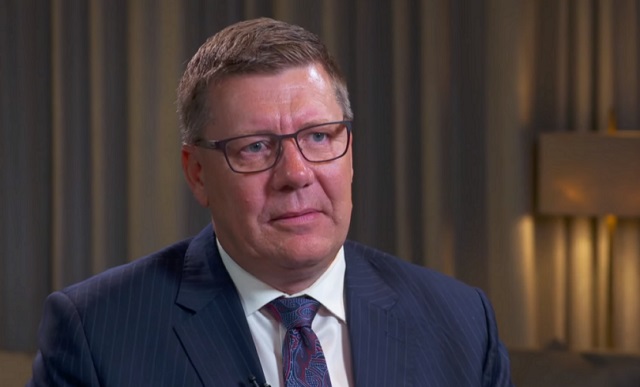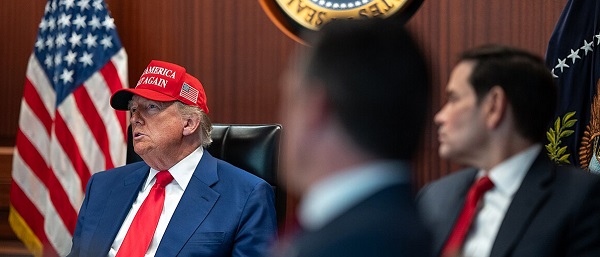National
Saskatchewan files injunction against Trudeau gov’t over carbon tax dispute

From LifeSiteNews
Saskatchewan’s Justice Minister Bronwyn Eyre confirmed Thursday that the province has filed a court injunction to try and stop Canada’s tax agency from seizing its bank account because it has refused to collect an ever-increasing carbon tax instituted by the Liberal government of Prime Minister Justin Trudeau.
In a video update on Thursday posted to X, Eyre, who services as both justice minister and attorney general for Saskatchewan, confirmed that the Trudeau government is “sending the Canada Revenue Agency after the Province’s bank account” over Premier Scott Moe’s refusal to collect the carbon tax on home heating.
Eyre noted that because the “Saskatchewan government was providing the same carbon tax relief here that the federal government was giving to other Canadians,” the Trudeau government is “threatening us again with their favorite move when someone disagrees with them.”
“They’re sending the Canada Revenue Agency after the Province’s bank account. That’s what they’re doing,” she said. “And the reason they’re doing this is because we are providing Saskatchewan residents with the exact same carbon tax exemption as Trudeau is giving other Canadians.”
As reported before by LifeSiteNews, in October of last year, amid dismal polling numbers that showed his government would be defeated in a landslide by the Conservative Party come the next election, Trudeau announced he was pausing the collection of the carbon tax on home heating oil for three years.
While it was a welcomed move by many, home heating oil is almost exclusively used in Atlantic Canada, meaning the tax break really only applied to certain citizens, namely the 24 seats in Atlantic Canada currently held by the Liberals.
Going a step further, Trudeau refused to offer a similar carbon tax relief to those who heat their homes with natural gas, the main product used in provinces such as Alberta and Saskatchewan. This led to Moe announcing his government would take matters into its own hands by pausing the collection of the federal carbon tax on natural gas for home heating, a policy which took effect on January 1, 2024.
Moe has continued to state that his policy is one of fairness, arguing that now citizens of Saskatchewan, like in Atlantic Canada, do not have to pay carbon tax on home heating bills.
In the Thursday video, Eyre said that it is “unconstitutional” to go after a province’s bank account as “section 126 of Canada’s constitution does not allow the federal government to grab money from a province’s bank account.”
“So today, the province of Saskatchewan has filed an injunction to try to stop this unfair and unconstitutional cash grab by the Trudeau government,” she noted.
Eyre added that when it comes to the issue of not collecting the carbon tax, it’s “about fairness and the fair application of the law.”
“The Trudeau-NDP carbon tax should be taken off everything for everyone,” she said. “But until that happens, your Saskatchewan government will protect our province and ensure tax fairness for Saskatchewan families.”
The Trudeau government has not only denied tax exemptions, it has remained adamant that it will continue increasing the carbon tax rate.
On April 1, the Trudeau government increased the carbon tax from $65 to $85 per tonne despite seven of 10 provincial premiers objecting to the increase, and 70 percent of Canadians saying they are against it.
To reach Trudeau’s goal of net zero by 2050, the carbon tax would have to balloon to $350 per tonne.
Business
No Jobs Clause: Liberals Under Fire Over Stellantis Deal in Fiery Committee Showdown

It was less of an industrial strategy and more of a cultural manifesto wrapped in a subsidy package… clause after clause mandates social goals: The “50-30 Challenge” pushes for 50% women and 30% underrepresented groups on boards, with detailed reporting on diversity metrics… But job protections? Squishy at best.
Folks, here’s why every Canadian should be boiling mad: Just two years ago, on May 2, 2023, Justin Trudeau’s Liberals were all grins and photo ops, announcing a whopping $15 billion deal with Stellantis to build the NextStar EV battery plant in Windsor, Ontario. Trudeau himself called it a “historic agreement” that would “create thousands of well-paying jobs” and position Canada as a leader in electric vehicles. But fast-forward to October 14, 2025, and Stellantis pulls the plug on Brampton: They’re shifting production of the Jeep Compass from the Ontario plant to Belvidere, Illinois, citing “market conditions” exacerbated by Donald Trump’s reinstated 25% tariffs on Canadian-made vehicles. As Reuters reported on November 3, 2025, those tariffs—slapped on earlier this year—made it untenable to keep building in Canada for the U.S. market. Result? 3,000 workers laid off indefinitely, a facility idled since February 2024, and billions in taxpayer subsidies looking like a sucker punch. Stellantis isn’t even hiding it; their press release that day admitted the move was to “optimize operations” amid tariff pressures, investing $600 million in Illinois instead.
It’s a question that should make every Canadian furious, particularly anyone who still believes that the government’s role is to defend the nation’s workers rather than sell them out to foreign multinationals under the guise of “green investment.” The Trudeau government—with a lot of ribbon-cutting, back-patting, and press conference confetti—told us this was a generational opportunity. Up to $15 billion of taxpayer money was pledged through a combination of federal and Ontario subsidies, a massive, glittering pile of cash dumped at the feet of a foreign company to secure so-called “green jobs” in the electric vehicle sector. Split two-thirds federal and one-third provincial, it’s tied to production incentives—paid per kilowatt-hour as batteries roll out, not upfront, per the redacted contract leaked by CBC on October 29, 2025. But that didn’t stop the Liberals from hyping it as a slam-dunk for Canada’s economy.
At the time, Liberal ministers paraded through Windsor and Brampton with photographers in tow, declaring that the NextStar EV battery plant and a retooled Brampton assembly line would solidify Canada’s future in the EV revolution. The Strategic Innovation Fund was rolled out like a magic wand—promising prosperity, sustainability, and, of course, “equity.” Not just for jobs, but for gender representation, for racial diversity on corporate boards, for net-zero targets. It was less of an industrial strategy and more of a cultural manifesto wrapped in a subsidy package. As revealed in the CBC-leaked documents, clause after clause mandates social goals: The “50-30 Challenge” pushes for 50% women and 30% underrepresented groups on boards, with detailed reporting on diversity metrics. Climate commitments? Baked in, with net-zero benchmarks. But job protections? Squishy at best.
But now, Stellantis is pulling up stakes in Brampton. They’re shipping production of the Jeep Compass south—to Illinois. The line is shutting down. Three thousand jobs are gone, and Ottawa’s response? A letter. A procedural dispute-resolution letter sent to Stellantis lawyers on November 3, 2025, with the government now claiming the company broke a “binding agreement.” As Industry Minister Mélanie Joly told the parliamentary committee that day, “We will start the 30-day period of the formal dispute resolution process in order to bring back production at the Stellantis Brampton facility.” She added, “These actions are not symbolic. They’re the direct consequence of the violation of clear commitments.” The same government that only weeks ago was hailing this deal as a model for the future now admits it may not even contain an enforceable jobs guarantee. The language is vague. The numbers are redacted. The accountability? Nonexistent.
The Industry Minister, Mélanie Joly, faced her grilling on Parliament Hill during a meeting of the House of Commons Standing Committee on Industry and Technology (INDU)—that exposed just how hollow this whole deal really was. Conservative MPs, including Raquel Dancho and Michael Guglielmo, demanded to see the clause. Which clause did Stellantis allegedly violate? What exactly was the commitment to Brampton? How many jobs were actually guaranteed? Was there a number? Was it enforceable? The Minister couldn’t—or wouldn’t—say. She deflected, pointed to redacted documents, and, when pressed about why the contract was packed with detailed social engineering mandates on board diversity but lacked hard job protections, accused her critics of being “against women.”
You can’t make this up.
Raquel Dancho, hammering in the core question that everyone watching already knew the answer to, asked,
“Was it 3,000 jobs that that SIF agreement with Brampton guaranteed?”
The minister responded like a bureaucratic ghost, floating just above the substance of the question.
“There are job guarantees in all the different contracts,” she said, “but you absolutely need to make sure that you see not only the contract… but also its amendment.”
Translation: Trust us. It’s in there somewhere. You just can’t see it.
Dancho pushed again: Where’s the number? Where’s the clause? The minister replied, “Clearly it is about protecting jobs. It is also about the production at the Brampton facility.” Not a single figure. Not a single line reference. Just the usual empty affirmation: “We care.”
Dancho didn’t let up. She cut through the fluff with brutal clarity:
“Surely there should be an explicit Canada-wide jobs guarantee. But we’re splitting hairs here. You’ve been evasive about the numbers… I’m not sure if you understand the magnitude of the money that you’ve committed.”
Then came the math:
“Over 647,000 full-time, two-parent Canadian families had to work an entire year to provide the $11 billion your government handed over to Stellantis. And still, there’s no explicit jobs guarantee.”
And when Michael Guglielmo followed up with the most damning observation of all—why are the clearest commitments in this contract about gender and racial equity quotas, not Canadian jobs?—the minister didn’t even deny it. She shot back with the cheap and predictable counterpunch:
“Are you against women being on boards?”
This is what it’s come to.
Instead of defending Canadian workers, the minister defends ideological clauses. Instead of admitting they cut a $15 billion cheque without a locked-down jobs guarantee, they imply that questioning the deal is somehow anti-diversity. These people don’t just miss the point—they refuse to even stand in the same room as the point.
Because the priority wasn’t jobs. It was ideology. The contract’s most detailed provisions weren’t about keeping Canadians employed—they were about the “50-30 challenge,” ensuring that Stellantis boards hit quotas: 50% women or non-binary individuals, 30% racialized, LGBTQ+, Indigenous, or disabled. These were enforceable clauses. Meanwhile, the 3,000 Brampton workers whose plant just shut down got… vibes.
That’s not economic strategy. That’s social engineering masquerading as industrial policy.
And now, when the jobs are gone, when Brampton is shuttered, when the workers are packing up their toolboxes and wondering how they’re going to pay their mortgage, the Liberals say they’re “launching a dispute-resolution process.” They sent a letter. They held a press conference. The Prime Minister, not present. The Minister, ducking behind amendments and redactions. And Canadians are left asking the only question that matters: Did we just get played?
Yes. We did.
The Liberals want you to believe this is just the price of doing business in a green economy. That global supply chains shift. That the transition to EVs is complicated. That we must continue to “work together.” But that’s not leadership. That’s surrender. The truth is, this wasn’t an industrial strategy—it was a $15 billion act of political performance art. A press release dressed up as policy. A parade of woke checkboxes signed into law while real, blue-collar livelihoods were used as bait.
And now we’re paying for it—not just in tax dollars, but in lost paychecks, empty factories, and shattered trust.
This is what happens when your government governs with hashtags instead of handshakes. When they negotiate with ideology, not leverage. When they cut billion-dollar deals and forget to actually protect the people they claim to represent.
Stellantis didn’t betray Brampton. The Liberal government did.
If there was a real deal—an actual, enforceable agreement that tied billions in taxpayer money to thousands of Canadian jobs—we’d be hearing about it nonstop. The Liberals wouldn’t be hiding behind redactions, amendments, and vague references to “linked contracts.” They’d be shouting from every podium: Here’s the clause. Here’s the violation. Here’s the money we’re clawing back. But instead, what do we get?
We get, “You’ll find it.”
We get, “It’s in the amendment.”
We get, “It’s commercially sensitive.”
It’s a shell game. A bureaucratic sleight of hand. Because the truth is, if this government had locked in a rock-solid guarantee, they’d be waving it in your face. They’d be naming names and quoting line numbers. But they can’t. Because it doesn’t exist. Or worse, because they were too arrogant or incompetent to include it in the first place.
And frankly, I’m not surprised. We’ve come to expect this from a Liberal government that governs by photo op and backpedals by committee. But what this is really about—what this entire spectacle reveals—is not just incompetence. It’s the desperate attempt to hide that incompetence from their own base. To maintain the illusion that they’re builders of the future while the factories go dark behind them.
They knew what they were doing. They just didn’t care who paid for it.
Business
Carney government’s first budget should signal end to crippling ‘climate’ policies

From the Fraser Institute
The Carney government will table its long-awaited first budget tooday. The vote on the budget is expected to be a confidence vote, so the stakes are high. Everyone is speculating about what’s to be in it. CBC, the Toronto Sun and Global News are all reading the tea leaves. And I hate to miss a tea party.
The budget is, naturally, going to have major implications for Canada’s economic indicators of debt, deficit, spending, governmental expansion/contraction, and so on. I’ll leave all that macroeconomics to my colleagues at Fraser Institute. But Prime Minister Carney has made some specific claims in my areas of specialty (environment, natural resources and regulation), and has made noises about Canada becoming an “energy superpower” and “building things” again. He’s also, in speeches leading up to the budget, re-affirmed that the Trudeau-era climate-change-centric, carbon-emission-control mindset is unchanged. The wording has changed, but the focus and predicates remain. Now though, rather than pounding on terms such as carbon, greenhouse and climate change, it’s all about Canadian policy being “responsible,” “sustainable,” “moral” and “equitable.”
Here’s what I’ll look for in the budget.
First, will the government dismantle or reform bills C-48, C-69 and the oil and gas emission cap—the three-pronged trident of death for major oil and gas development in Canada? Without this, it will be difficult to take any of his talk of energy superpower or natural resource trade renaissance seriously.
Second, will the government renounce or seriously reform the economically irrational, unattainable and crippling “net-zero 2050” anti-carbon agenda and shift Canada’s climate policy from emissions abatement to something potentially more attainable, such as adaptation and resilience building? Will it free Canada’s carbon natural resource economy to be the engine of Canadian prosperity and international competitiveness once again? Or keep Canada’s carbon (oil and gas) economy (and manufacturing economy) on a path toward extinction?
Third, will the government reset the tone of Canadian culture and defuse some of the adversarial relations with resource-rich provinces by acknowledging that Canada’s natural-resource economy has been, is now and must continue to be a cornerstone in Canada’s total economy? Or will it stick to the “net-zero” extinction process for carbon emissions, which will also be an extinction process for anything that requires substantial energy generation, and for the development of natural resources as the primary wealth engine of Canada? Will the government end the disdain for the role of Canada (and notably some of Canada’s western provinces) as a natural-resources export economy?
The budget will offer a window into the mind of Prime Minister Carney on the matter of natural resources in Canada’s economy and society. With global changes undermining the international carbon control regime and idee fixe, and with an understanding that Canada is on an economic precipice, there’s an opportunity here. Let’s hope Carney works to unshackle one of Canada’s greatest engines of economic progress—its energy and natural resource production, transformation, transportation, consumption and exportation.
Canadians could use the boost in quality of life that Canada’s natural resources could bring to current and future generations.
-

 Crime2 days ago
Crime2 days agoPublic Execution of Anti-Cartel Mayor in Michoacán Prompts U.S. Offer to Intervene Against Cartels
-

 Environment2 days ago
Environment2 days agoThe era of Climate Change Alarmism is over
-

 Alberta4 hours ago
Alberta4 hours agoAlberta government’s plan will improve access to MRIs and CT scans
-

 Alberta1 day ago
Alberta1 day agoCanada’s heavy oil finds new fans as global demand rises
-

 Justice2 days ago
Justice2 days agoA Justice System That Hates Punishment Can’t Protect the Innocent
-

 Daily Caller12 hours ago
Daily Caller12 hours agoTrump Reportedly Planning Ground Troops, Drone Strikes On Cartels In Mexico
-

 Daily Caller1 day ago
Daily Caller1 day agoNigeria Would Welcome US Intervention In Massacre Of Christians By Islamic Terror Groups
-

 Automotive1 day ago
Automotive1 day agoCanada’s EV experiment has FAILED











